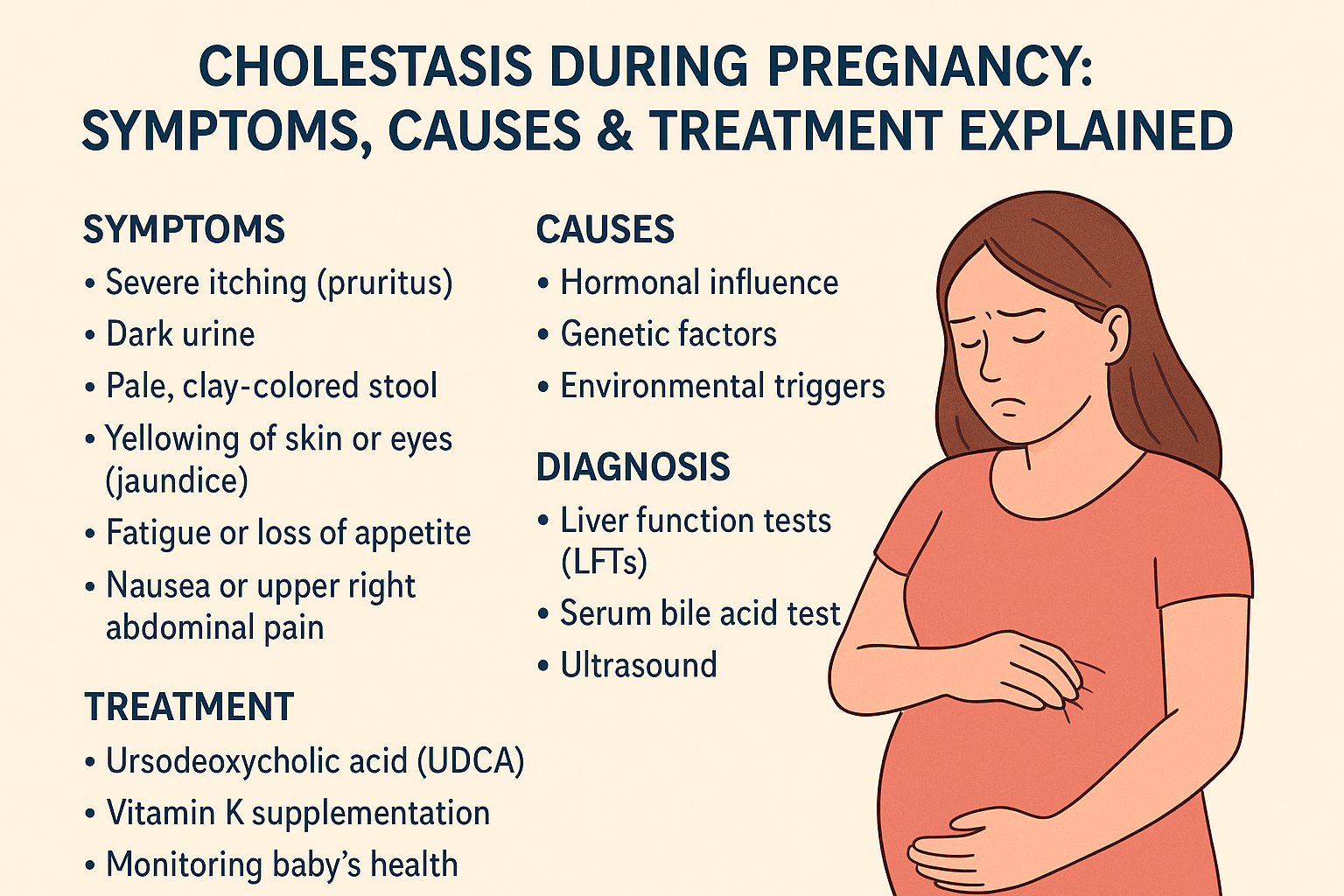Pregnancy is a beautiful journey—but it also brings changes in your body that sometimes need extra attention. One such condition is Cholestasis During Pregnancy, a liver disorder that typically appears in the third trimester and causes intense itching, especially on the palms and soles. While cholestasis doesn’t usually cause long-term harm to the mother, it can pose risks to the baby if not diagnosed and managed at the right time.
Many women initially ignore the itching, thinking it’s “normal during pregnancy,” but cholestasis is different—it becomes more severe at night, does not improve with creams, and often feels unbearable. Understanding the symptoms early and seeking medical care helps protect both mother and baby. This blog explains everything you need to know, including causes, warning signs, treatment, and when to consult Dr. Prajakta Sable, best Gynecologist in Hinjewadi, for proper care.
What Is Cholestasis During Pregnancy?
Cholestasis of pregnancy—also called Intrahepatic Cholestasis of Pregnancy (ICP)—is a condition where the flow of bile from the liver slows down or becomes blocked. This causes bile acids to build up in the bloodstream, leading to severe itching and, in some cases, complications for the baby.
It is more common in:
-
Third trimester
-
Women carrying twins
-
Those with a family history of liver disorders
-
Previous pregnancy with cholestasis
Symptoms of Cholestasis During Pregnancy
The symptoms may vary, but the most common ones include:
1. Severe Itching (Pruritus)
-
Most intense on palms and soles
-
Worsens at night
-
No rash (skin appears normal)
2. Dark Urine
A sign that bile is not flowing properly.
3. Pale, Clay-Colored Stool
Indicates disturbed digestion of fats due to reduced bile flow.
4. Yellowing of Skin or Eyes (Jaundice)
Seen in a smaller percentage of cases but important to note.
5. Fatigue or Loss of Appetite
General discomfort due to liver stress.
6. Nausea or Upper Right Abdominal Pain
Less common but can occur if liver enzymes are significantly elevated.
Causes of Cholestasis During Pregnancy
The exact cause isn’t always clear, but several factors play a role:
1. Hormonal Influence
High levels of pregnancy hormones—especially estrogen—can slow the flow of bile.
2. Genetic Factors
Some women carry genes that affect liver function, making them more prone.
3. Environmental Triggers
Seasonal changes, diet, and mineral deficiencies may contribute in some cases.
How Is Cholestasis Diagnosed?
Your gynecologist may recommend:
-
Liver function tests (LFTs)
-
Serum bile acid test (the most important)
-
Ultrasound to rule out other liver conditions
Early testing is crucial because sometimes itching appears before test values start rising.
Treatment Options for Cholestasis During Pregnancy
While cholestasis resolves after delivery, the goal is to protect the baby and reduce symptoms during pregnancy.
1. Ursodeoxycholic Acid (UDCA)
-
Most commonly prescribed
-
Lowers bile acid levels
-
Reduces itching
-
Improves liver function
2. Vitamin K Supplementation
Helps prevent bleeding issues in some women.
3. Monitoring Baby’s Health
-
Non-stress tests
-
Weekly or bi-weekly scans
-
Monitoring fetal movements
4. Early or Planned Delivery
Many women are advised to deliver between 36–38 weeks to reduce risk to the baby.
5. Skincare Measures
-
Cool baths
-
Moisturizers
-
Loose, cotton clothing
These may ease itching but do not treat the root cause.
Possible Risks (If Untreated)
Although rare when managed properly, unmanaged cholestasis may increase the risk of:
-
Preterm birth
-
Meconium (baby’s stool) in amniotic fluid
-
Fetal distress
-
Stillbirth (in severe cases)
Proper monitoring greatly reduces these risks.
What if it’s not cholestasis but you still have itching ?
Other conditions causing itching are:
Polymorphic Eruption of Pregnancy (PEP)
Pemphigoid Gestationis (PG)
Atopic Eruption of Pregnancy (AEP)
When to Consult a Gynecologist
You should seek immediate evaluation if:
-
Itching becomes severe, especially on palms/soles
-
Itching worsens at night
-
There is no rash but discomfort keeps increasing
-
You notice dark urine or pale stools
-
You have a history of cholestasis in earlier pregnancy
-
You feel reduced baby movements
Never ignore persistent itching in pregnancy. Early testing and timely treatment ensure a safer pregnancy.

Consult Dr. Prajakta Sable – Best Gynecologist in Hinjewadi
If you experience any symptoms of cholestasis or need expert pregnancy care, you can consult Dr. Prajakta Sable, a trusted and experienced gynecologist in Hinjewadi.
She offers:
-
Accurate diagnosis
-
Safe monitoring
-
Personalized treatment plans
-
Guidance for high-risk pregnancies
Request a Call Back
If you have concerns or want to discuss your symptoms, simply request a call back or visit our website and the clinic team will get in touch to assist you promptly.

